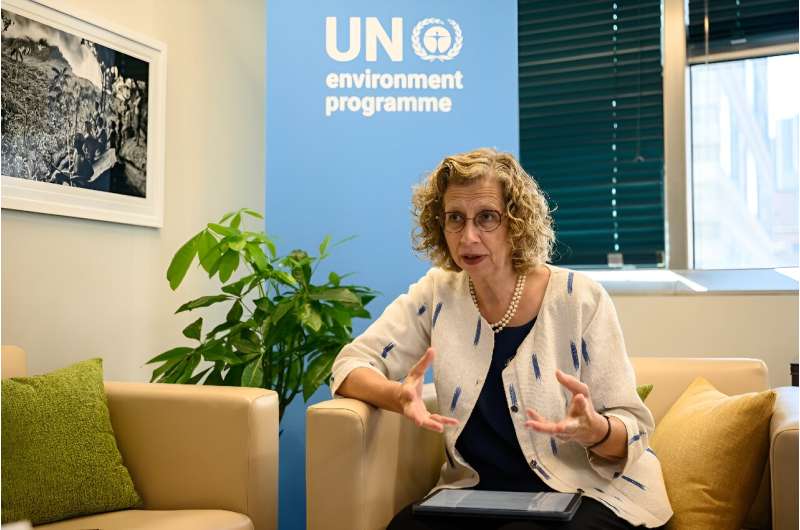This article has been reviewed according to Science X's editorial process and policies. Editors have highlighted the following attributes while ensuring the content's credibility:
fact-checked
reputable news agency
proofread
Recycling plastic not enough, warns UN environment chief

With the production of plastic on the rise worldwide and creating ever more pollution, the UN environment chief warned that humanity cannot just recycle its way out of the mess, and she called for a total rethink about the way we use plastics.
"There are different sort of onramps to the highway to solutions. But I think everybody recognizes that the status quo is just not an option," said Inger Andersen, director of the UN Environment Program, in an interview Thursday with AFP on the sidelines of the General Assembly in New York.
Andersen was talking two weeks after the publication of the first draft of a future international treaty on plastic pollution, which is expected to be finalized by the end of 2024.
It reflects the wide range of ambitions of the 175 countries involved, notably the gap between those who argue for a reduction in the production of raw polymers and those who insist on reuse and recycling.
First, Andersen said the aim was to get rid of as many single-use plastics as possible, "eliminating what's frankly not necessary: that thing that is wrapped in plastic that's completely mindless, that is maybe even wrapped by nature itself," like an orange or a banana.
Then, "there is thinking about the product itself. Does the product need to be liquid? Can we rethink the product... can it be powder, can it be compressed, can it be concentrated?" she said, saying that when entering a supermarket, she goes straight to the soap aisle to see if solid versions are available.
"We also have to reduce the overall supply of new raw polymer," she said, noting that this was one option in the draft text of the treaty.
Oceans a 'collective heritage'
For sure, "we have to recycle as much as we can. But as we look at it now, plastic uses is increasing," Andersen told AFP.
"So what is clear is that we cannot recycle our way out of this mess."
Annual production of plastics has more than doubled in the past 20 years, to reach 460 million tons. It could triple by 2060 if nothing changes.
However, only nine percent is recycled. Plastic waste of all sizes is found today at the bottom of the oceans, in the stomachs of birds and on the tops of mountains, while microplastics have been detected in blood, breast milk and placentas.
"If we continue to pump into the economy all this new raw polymer, there is no way that we will stop the plastic flow into the oceans," she said.
And the health of the oceans is crucial for the future of humanity.
The future treaty on plastic pollution would complement the global arsenal to protect the oceans, including the new historic treaty to protect the high seas signed this week by some 70 countries.
"The fact that we're going to move forward and protect that piece of the ocean that is beyond national boundaries is mind-blowingly important," Andersen said.
"And something that I'm just very, very happy about. And the whole world should be because this is our common heritage."
© 2023 AFP




















